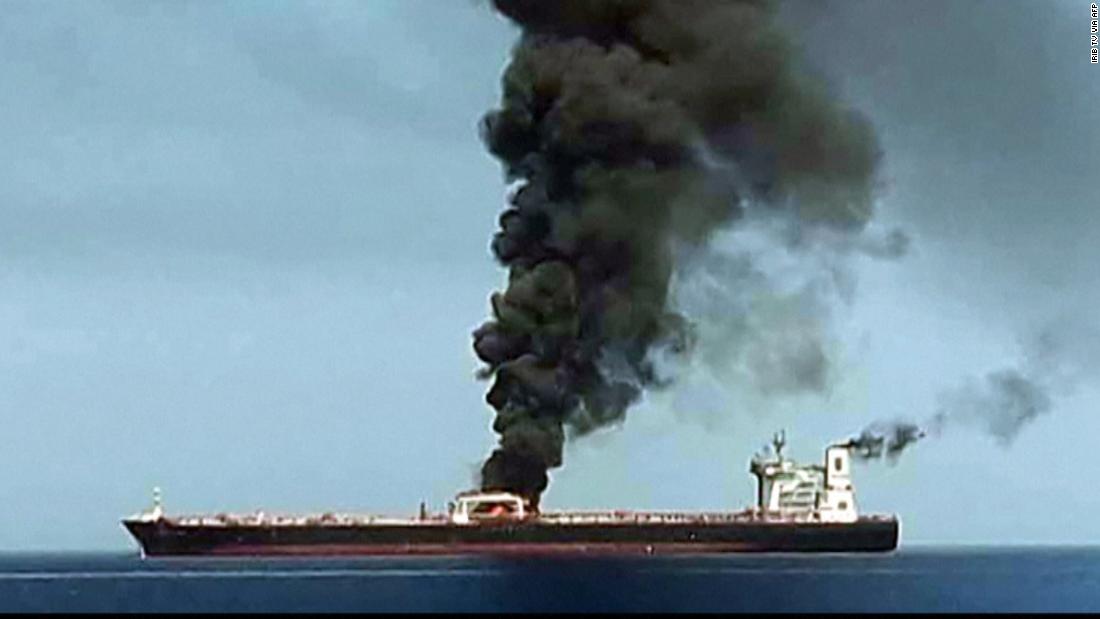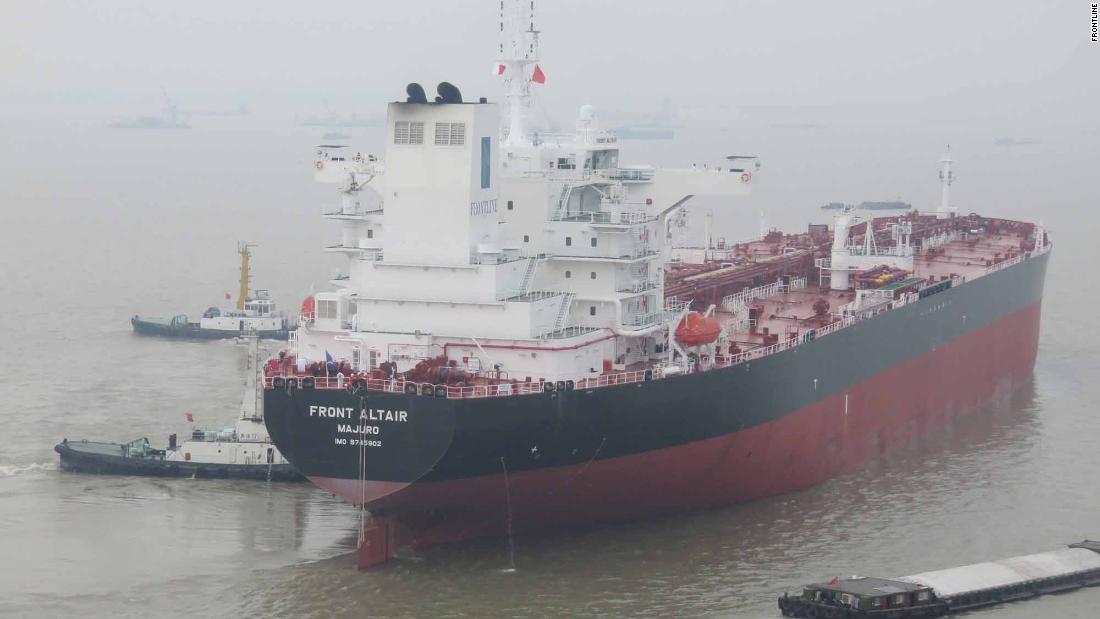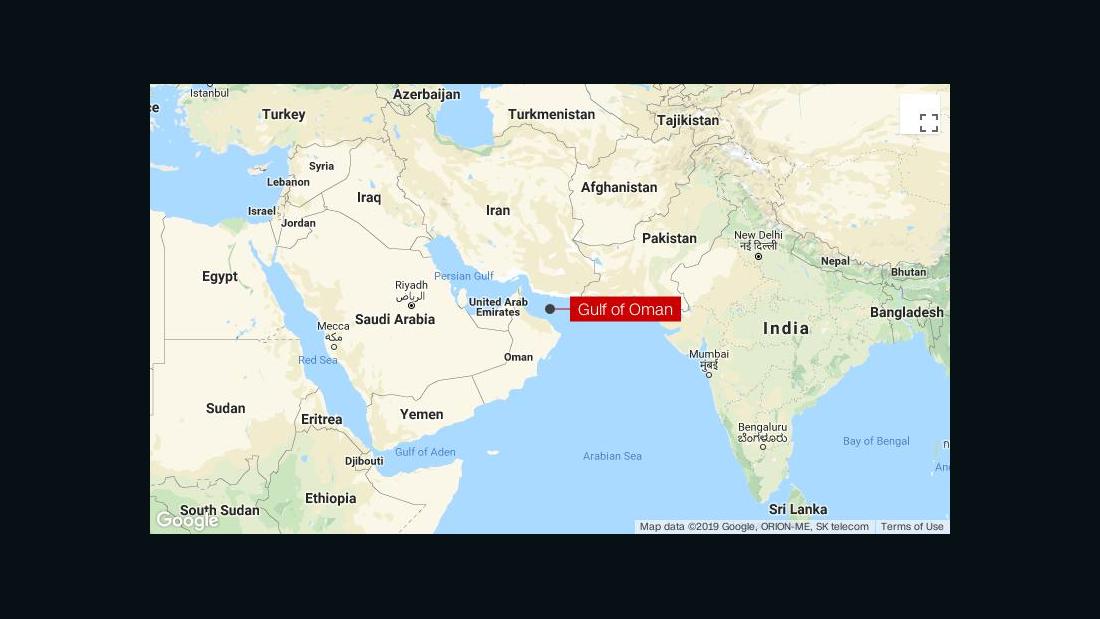AFP/Getty Images
A picture broadcast on Iranian state television shows smoke billowing from a tanker said to have been attacked off the coast of Oman on Thursday.
ISTANBUL — Two oil tankers in the Gulf of Oman came under suspected attack early Thursday amid soaring tensions between the United States and Iran.
A Japanese-owned ship was targeted just as Japan’s prime minister, Shinzo Abe, wrapped up a high-stakes visit to Tehran to help cool hostilities in the region and potentially mediate U.S.-Iran talks.
The attack appeared timed to undermine those efforts, which Abe had called “a major step forward toward securing peace and stability in this region,” Japan’s Kyodo news agency reported.
Both Iran and the U.S. Navy’s 5th Fleet in Bahrain said they were assisting the two ships, whose crews were evacuated safely.
A second vessel, owned by Norway’s Frontline, was on fire and adrift in the Gulf of Oman near the Strait of Hormuz, a company spokesman told Norwegian media.
The Japanese-owned ship, which was carrying methanol, suffered damage to its hull, a company statement said.
Iranian Foreign Minister Mohammad Javad Zarif said Thursday on Twitter that the attack took place while Abe was meeting with Iran’s supreme leader, Ayatollah Ali Khamenei, for “extensive and friendly talks.”
[Trump administration considers responses to potential Iranian attacks, including troop increase]
“Suspicious doesn't begin to describe what likely transpired this morning,” he said.
The exact circumstances of the attack were unclear. But the incident follows a similar operation targeting oil tankers in the same area last month, an assault that U.S. officials blamed on Iran. Iranian officials deny involvement.
The Trump administration announced May 5 it was sending an aircraft carrier and fleet of bombers to the region, a move national security adviser John Bolton called a ‘clear and unmistakable message for Iran.’
The Gulf of Oman links the Arabian Sea with the Strait of Hormuz, the gateway to the Persian Gulf. The gulf has been a flash point for tensions between Iran and the United States, which in recent months has stepped up its “maximum pressure campaign” to isolate Tehran on the world stage.
Last month, the U.S. military sent additional assets to the Persian Gulf region to counter what it said were Iranian threats to U.S. interests.
The Japanese president of the Kokuka Sangyo shipping company, which owns the Kokuka Courageous ship that was attacked Thursday morning, said the vessel was hit twice over a three-hour period.
“The first attack caused a fire in the engine room, which [the crew] managed to extinguish,” Yutaka Katada, president of Kokuka Sangyo, told reporters in Tokyo.
“Three hours later, they were attacked again,” he said. “They felt it was unsafe to stay on board. The captain gave the order to evacuate, [and] they fled on life boats.”
Japan’s economy minister, Hiroshige Seko, said he was “urging related business operators to take precautions, reconfirming the communication system, and reconfirming the energy supply system.”
[The oil route that could become central to mounting tensions between Iran and the U.S.]
While meeting with Japanese Prime Minister Shinzo Abe in Tehran June 13, Iranian Supreme Leader Ayatollah Ali Khamenei disparaged President Trump.
About 80 percent of Japan’s oil imports come from the Middle East and travel through the Strait of Hormuz. Japan is a key U.S. ally but enjoys long-standing diplomatic and cultural ties with Iran.
Abe’s aides said the prime minister’s visit was not part of a specific mission to mediate between the United States and Iran.
Khamenei’s office, however, released a statement following their meeting that said Abe had carried a message from Trump to Iran.
“I do not consider Trump, as a person, deserving to exchange messages with,” Khamenei’s website quoted him as saying. “We will not negotiate with the United States.”
President Trump last year decided to withdraw the United States from a 2015 nuclear pact Iran that signed with world powers. The deal lifted U.S. and other sanctions on Iran in exchange for restrictions on its nuclear energy program.
The Trump administration has implemented a near-total embargo on Iran’s economy and has urged allies to cut commercial ties with Tehran.
According to the U.N. nuclear watchdog, the International Atomic Energy Agency, Iran remains in compliance with the 2015 agreement.
Denyer reported from Tokyo. Akiko Kashiwagi in Tokyo contributed to this report.
Read more:
Today’s coverage from Post correspondents around the world
Like Washington Post World on Facebook and stay updated on foreign news
Let's block ads! (Why?)
https://www.washingtonpost.com/world/oil-tankers-attacked-in-gulf-of-oman-us-navy-says/2019/06/13/d59b784c-8db0-11e9-b162-8f6f41ec3c04_story.html
2019-06-13 11:44:17Z
52780313915074


